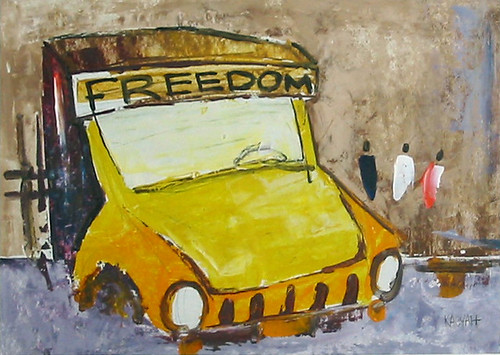All Available Indignities
As the ghosts of numerous tyrants, from Julius Caesar to Benito Mussolini will testify, people are very hard on those who, having had power, lose it or are destroyed. Then anger at past arrogance is joined with contempt for present weakness. The victim or his corpse is made to suffer all available indignities.
— The Great Crash 1929 by John Kenneth Galbraith
The growth of his power and fame was matched, in my imagination, by the degree of the punishment I would have liked to inflict on him. Thus, at first, I would have been content with an electoral defeat, a cooling of public enthusiasm. Later I already required his imprisonment; still later, his exile to some distant, flat island with a single palm tree, which like a black asterisk, refers one to the bottom of an eternal hell made of solitude, disgrace, and helplessness. Now, at last, nothing but his death could satisfy me.
— Tyrants Destroyed by Vladimir Nabokov
"The widespread anarchy and the disillusion of the masses... made this revolution necessary. In the years since independence, fundamental human rights were brutally violated by the government. People were denied the right to live in freedom and with mutual respect. They were not allowed to have their own opinions. Organized political gangsterism and the politics of falsehood turned all elections into a farce. Instead of serving the nation, politicians were busy stealing. Unemployment and exploitation were on the rise, and in their sadism toward the population, the small clique of feudal fascists in power knew no bounds."...Optimism quickly turned to disenchantment and pessimism. The people's bitterness, fury, hatred was now directed against their own elites, who were rapidly and greedily stuffing their pockets.
— The Shadow of the Sun by Ryszard Kapuscinski. Here, he quoted a statement by a youth movement and observed the aftermath of Nigeria's 1966 coup.
There is no one, or hardly any one, so wicked or so stupid as to deny the democratic ideal. There is no one, or hardly any one, so perverted that, were he the member of a small and simple community, he would be content to forgo his natural right to be a full member thereof. There is no one, or hardly any one, who would not feel his exclusion from such rights, among men of his own blood, to be intolerable. But while every one admits the democratic ideal, most men who think and nearly all the wiser of those who think, perceive its one great obstacle to lie in the contrast between the idea and the action where the obstacle of complexity - whether due to varied interests, to separate origins, or even to mere numbers - is present.The psychology of the multitude is not the psychology of the individual...
Look at a crowd when it roars down a street in anger — the sight is unfortunately only too rare today — you have the impression of a beast majestic in its courage, terrible in its ferocity, but with something evil about its cruelty and determination. Yet if you stop and consider the face of one of its members straggling on one of its outer edges, you will probably see the bewildered face of a poor, uncertain, weak-mouthed man whose eyes are roving from one object to another, and who appears all the weaker because he is under the influence of this collective domination....
Now it is peculiar to the French among the great and independent nations, that they are capable, by some freak in their development, of rapid communal self-expression. It is, I repeat, only in crises that this power appears.
— A Force in Gaul by Hilaire Belloc (from On Something)
As the Tunisians, and now Egyptians, are currently demonstrating, this quality of "rapid, communal self-expression" is certainly not a Francophone singularity. History, contra Belloc, has forever shown that crowds can turn from inchoate to determined in mere hours. All tyrants and their Lady Macbeths are on notice. Still, a little sweat on their part, and the dismayed sensitivities of onlookers at the sight of turmoil in their marriages of convenience, are, all things considered, a small price to pay.
File under: tyrants, rogues, literature, quotes, history, dissent, anger, revolution, groups, organization, crowds, culture, observation, perception, zingers, Observers are worried, toliHe who tests the depth of a stream with both feet must be prepared to swim.
— Ewe proverb, Ghana


No comments:
Post a Comment